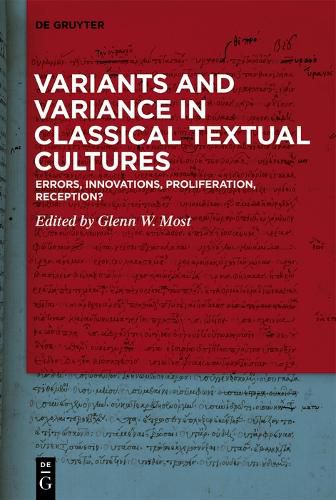Readings Newsletter
Become a Readings Member to make your shopping experience even easier.
Sign in or sign up for free!
You’re not far away from qualifying for FREE standard shipping within Australia
You’ve qualified for FREE standard shipping within Australia
The cart is loading…






Given the limited durability of most textual supports, texts must be reproduced if they are to survive. And given the proliferation over time of users, practices, and places which need to have access to the texts that are important for cultural institutions, this is particularly true for authoritative texts. But the reproduction of texts by traditional means - either orally or by hand - inevitably produces variations. These variations can arise because of inattention, confusion, misunderstanding, deliberate modification, physical damage, and many other factors. In general, the more a text is reproduced, the more variations are likely to occur. But although the fact of textual variation in general is doubtless an anthropological universal, the specific forms it takes and the specific attitudes to its occurrence seem to vary widely from culture to culture. How variations develop in different cultures, on the basis of which forms of scholarly practices, collaborations, and institutional frameworks; what variants say about a culture's understandings of text, authorship, and collective authorship; what happens when variants become creative and generate their own strands of tradition; to what degree changes in transmission media and processes of distribution, translations, or the migration of texts into different cultural or institutional contexts can influence or be influenced by the development of variants - these are the questions that this book addresses in a historical and culturally comparative perspective.
$9.00 standard shipping within Australia
FREE standard shipping within Australia for orders over $100.00
Express & International shipping calculated at checkout
Given the limited durability of most textual supports, texts must be reproduced if they are to survive. And given the proliferation over time of users, practices, and places which need to have access to the texts that are important for cultural institutions, this is particularly true for authoritative texts. But the reproduction of texts by traditional means - either orally or by hand - inevitably produces variations. These variations can arise because of inattention, confusion, misunderstanding, deliberate modification, physical damage, and many other factors. In general, the more a text is reproduced, the more variations are likely to occur. But although the fact of textual variation in general is doubtless an anthropological universal, the specific forms it takes and the specific attitudes to its occurrence seem to vary widely from culture to culture. How variations develop in different cultures, on the basis of which forms of scholarly practices, collaborations, and institutional frameworks; what variants say about a culture's understandings of text, authorship, and collective authorship; what happens when variants become creative and generate their own strands of tradition; to what degree changes in transmission media and processes of distribution, translations, or the migration of texts into different cultural or institutional contexts can influence or be influenced by the development of variants - these are the questions that this book addresses in a historical and culturally comparative perspective.